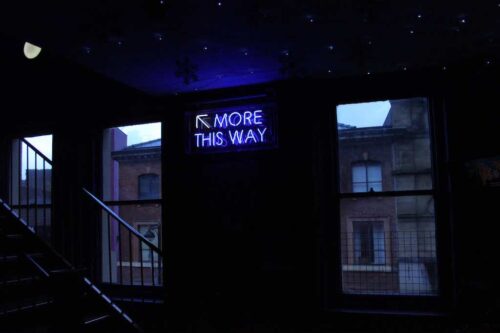Get cold calling!
My business coach said to me.
In fact, he was the second business coach to say that. So I did.
And…
...I was terrible.
It didn’t take me long to realise that I had no desire to start each and every business day with the feeling of rejection. I’m not sure how anyone has that level of resilience.
So, not to be defeated, I decided to outsource it. I’d give the task to someone who must like doing it as it’s their job!
And…
...it failed.
Again.
Only this time, I’d invested more than just time. I’d spent £4,000 with a cold calling (telemarketing) agency.
The end result?
Two meetings, neither of which were a good fit for my consulting business.
Is cold calling suitable for a B2B consulting business?
Before I get into the detail of cold calling, and whether or not you should do it in your consulting business, let me share with you why I found myself considering it in the first place.
I was nearing the end of my first year running my consulting business. I’d had a great start, having won some big projects at the outset selling to past clients and people that I already knew.
But those projects were now coming to an end. And they were really broad in nature, including:
- A data centre strategy for a university in Scotland
- A global applications strategy for one of the world’s biggest law firms
- A disaster recovery strategy for a Russian energy company’s investment arm
- Helping a law firm respond to a tender on a panel review
With the projects being so varied, I was having to work all the hours I could just to ensure I could keep up and deliver them successfully.
In so doing, I committed the consulting business cardinal sin. I ignored my marketing and sales.
As a result, my sales pipeline was empty!
And the marketing efforts that I had made were little more than a collection of sporadic outbursts of energy, mostly leading to nothing.
They included:
- A few blog articles
- A half-written guide
- An array of in-person networking events, none of which I attended consistently
- Coffee with a few different people
The truth of the matter is that this is where most consulting businesses find themselves, often somewhere between the end of their first and second year in business.
It’s at this point that most consulting businesses fail. The owners either return to employment, or they become a contractor – relying on recruitment agencies to find them work.
I needed new clients…. and fast!
I discussed my predicament with my business coach at the time.
His view was that cold calling was the quickest way to get results. So I set about learning all that I could about it.
Of course, what I was really doing was waiting for the perfect moment. Waiting until I’d learnt so much about cold calling, that I’d be world-leading from the off.
In reality, I was just procrastinating. Something that I often feel I have world-leading capabilities in!
I’d read that cold calling would be more effective if I sent a letter first. That way, I’d be warming the prospect up.
I also read that I should make the envelope containing the letter stand out in some way. For example, by making it an awkward shape so that it was delivered on the top of the post pile, rather than being sat within it.
Believe it or not, my business coach at the time even suggested that I include money in the envelope!
Guidance, I’m pleased to say, that I chose to ignore.
I did, however, choose to include a business card holder.
I bought these fantastic looking, faux-leather business card holders from eBay that cost all of £0.69p each, whilst looking much, much more expensive! (Trust me, they did, and I still can't believe they were so cheap all these years later!).
I stated in the letter to the prospect that we hadn’t yet met, but if we had we'd have exchanged business cards, hence why I was doing it now – by letter.
Inside the business card holder was, of course, one of my business cards. I then promised to follow up with a call within the next week.
In my first week I made 10 calls. I know, hardly a record-breaking number, but enough to give me an understanding.
The first 5 calls went through to voicemail, or mailboxes which were already full.
The next 4 calls went through to secretaries. The gatekeepers. Most of which said to me that the prospect (I was targeting CIOs of large law firms) had a preferred caller list and that I wasn’t on it!
End of call.
Now, If I was an expert, I’m sure I could have gotten past these gatekeepers.
On the 10th call, I did finally get through to my target prospect. Here’s how the call went:
Me: Hi, is that Mr CIO?
Mr CIO: Yes.
Me: Hi Mr CIO, I’m Martin Williams from Amazing Consultancy. I sent you a letter last week introducing myself, and the work that we do at Amazing Consultancy. Did you get my letter?
Mr CIO: No. And if I'm honest, if I did I’d have probably thrown it in the bin!
Now it doesn’t take a rocket scientist to see that this wasn’t going quite to plan. So, my response to the prospect was:
Me: “Ha, to be honest, that’s probably what I’d have done too. But since I do have your attention for a moment, may I just share with you some thoughts from some of the projects we’ve been working on in your sector? Specifically, we’ve just finished working with a large firm on their global applications strategy.”
I spent a total of 8 minutes on the phone with the prospect. And, at the end of the call, I got...
...nothing.
No agreement to follow up.
No planned coffee or in-person meeting.
No referral.
Nada.
Nothing.
It was at this point that I determined I was never going to be any good at cold calling.
In truth, I had thrown in the towel rather early, but I had no desire to start my every working day with rejection.
I don’t mind that I might lose occasionally lose out on a proposal, but that doesn’t happen too often. To start every day by losing was, to me, not a winning strategy.
Outsourcing was the answer….or so I thought
I took some advice from the people around me and decided that I should outsource the task.
I got a referral to a cold calling agency that had provided good results for a vendor that I was working with.
I did my due diligence. I met the agency in person. I spent time with the individual that would be doing the cold calling on my behalf. And I provided them with lots of information that they could pass on to the people that they called.
The next decision was:
Who to call?
I had my own list of prospects that I’d pulled together from various sources. The cold calling agency also had its lists, so we combined them and agreed upon a target audience.
I parted with £4,000 and the agency began its work.
It's at this point that people will say to you, "Oh you should only work with telemarketing agencies that get paid on results."
When I was looking for a cold calling agency, I didn’t find any that were prepared to be paid solely on results. You've got more chance of finding a real-world unicorn!
There was some flexibility from some, such as a base cost, and then a bonus for each scheduled meeting. However, that can get prohibitively expensive, especially as a meeting doesn't correlate to a sale.
Progress. Or lack thereof.
In short, the agency was struggling to get traction.
I was emotionally bought in to my business. And I’d emotionally bought into this agency. Therefore, the problem must have been with the people that we were calling.
The answer, I thought, was to call more people.
Different people.
Any people.
Call! Call! CALLLLLLL!
And, just like a gambling addict filling up a fruit machine, I continued to place bets.
I bet more money in the hope of improving my chances of success.
As I said earlier, come the end of my budgeted time with the agency, they'd secured a total of two meetings from hundreds of calls, neither of which proved to be a good fit for my consulting business.
So where did it all go wrong?
At the time, I blamed the cold calling agency. But as time went by, as I learnt more about marketing and sales, I realised that we were both at fault.
In essence, I’d asked the cold calling agency to:
- Call a bunch of strangers
- Introduce my company to these strangers
- Seek a meeting so that I could talk more to them about what we did
Let’s analyse that a bit further. I had the agency:
- Call people to talk about ME.
- Tell these people about what WE did.
- Get a meeting so that we can talk even more about US.
Moreover, I was searching for the proverbial needle in a haystack.
I was trying to find somebody who didn’t have an incumbent consultancy, or was unhappy with their incumbent, had problems that I could help with and was able to make the link between their problem and my services, and that would be happy to give their time to a total stranger.
Why did I ever think that this would work!?
Maybe I deserved to lose so much money for being so dumb!
Although, I think the agency was also partly to blame.
They should have advised me from the off that I wasn’t ready. That I needed to do more prep. I think, however, they were more focused on taking my money.
What should I have done, and more importantly, what should you do?
Firstly, engaging anyone in a conversation must be all about them!
They don't care about you, your firm, or your services. They only care about resolving the problems that they are facing.
Secondly, for a cold call to be successful, you must convince the person that you are calling that you are an expert in solving the problem that they are facing, and that you have plenty of experience in doing so.
This is really what marketing is all about for a B2B professional services firm. All of your marketing efforts must be about building trust with prospects around a specific topic (or set of topics) that matters to them.
Thirdly, you should do everything possible to avoid the need for a cold call! Instead, you should try and create the opportunity to have what I term a 'warm' call.
The ‘Warm’ call
Cold calling is a long-shot approach and it relies on:
- A lot of luck
- A lot of time and effort to increase the chances of luck
- Resilience to a lot rejection
There are some great cold callers out there, but you have to ask yourself if that it was you really want to become, and if you really have enough available time to get good enough at it.
Rather than a cold call, a warm call is where you reach out to people who have already expressed some interest in you, or at least, the information that you have to offer.
They'll do this by consuming your lead magnet (guide, checklist, webinar, etc.) and sharing their contact details. This gives you permission to contact them. To follow up.
The other benefit of warm calling over cold calling is that the chances of wasting time with tyre kickers is vastly reduced.
You see, there are two sides to cold calling.
On the one side there's the skill in landing the meeting. And on the other side there's the risk that the person you're calling is actually worth meeting. Sometimes you won't know that until you're with them.
in short, you may have to kiss a lot of frogs!
So it's not as simple as the statistic that cold calling is only 3% successful. You need to determine what success actually means.
Is it that you get to meet with a prospect? Or is it that you actually go on to make a consulting sale?
Conclusion
So, let’s recap. Perhaps we’ll define this as the 3 golden rules of cold calling:
- Don't cold call. Only warm call
- Build a marketing funnel. For example, offer free advice and guidance on your area of expertise in a guide made available on your website. In order to access this guide, the reader (prospect) must provide their contact details. This is known as ‘gated’ content on your website. By doing this, the prospect has raised their hand and given you permission to contact them. This is what makes a warm call
- Before you jump ahead and make the call and possibly even schedule an in-person meeting, do your research. Does the prospect align with your target client? i.e. organisation size, market sector, maturity, etc. If so, make the call (or get your cold calling agency to do so)
People swear that cold calling works, although many who do are actually selling cold calling training or services!
That said, it can work. Of course it can. The law of averages says it must.
And the amount of telemarketing agencies that exist suggests that some businesses have success with it.
For instance, one of my coaching clients managed to secure a £60k project from cold calling. Although even he would say that there was a hefty amount of luck involved in that one.
Often people tell you only half the story. They miss key details like the fact that it was a warm call rather than a cold call. Or that it took them 3 months of dialling 50 numbers a day.
If you're committed to cold calling, then by all means try it out, just don't be like I was! Be sure to focus on the client and their challenges, rather than you, your firm, and your services.
My preferred approach is to focus on a warm call instead. By focusing on warm calls you have more qualified leads to follow up with, and therefore lower costs with greater chances of success.





